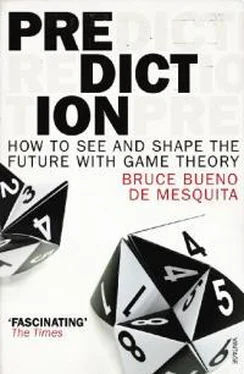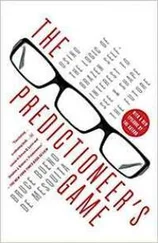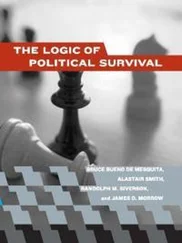Thankfully, in this particular case, we have a good source of information: the outgoing CEO. He knew who the players were and he knew how they felt about each candidate. And you can be assured he didn’t get to be CEO without knowing which of his colleagues had real clout and who would just go along with the wishes of others.
The existing procedure for succession in the CEO’s company did not involve head-to-head contests, ranking of candidates, runoffs, or a host of other common voting rules. Instead, they normally voted for all the candidates simultaneously, just as is done in American presidential elections. Whoever got the most votes would be the winner. Now that would have been very bad news for my client, the retiring CEO. It was clear that such a procedure, a fine, upstanding, legitimate procedure, would result in the election of Mutt, the detested candidate. What to do?
The first thing was to sort out who was likely to win each of the beauty contests. The stakeholders consisted of the members of the company’s CEO selection committee. Let’s say the committee was made up of fifteen individuals, with one vote each. The outgoing CEO’s information on the comparisons of candidates in pairs allowed me to tease out the strict order in which different committee members preferred the candidates. It was apparent that the fifteen committee members divided equally into five voting blocs based on their preferences, with three members in each group. Here are the five different preference orderings held by the members of the selection committee, with candidates listed from most preferred to least preferred:
Mutt, Jeff, Larry, Curly, Moe
Mutt, Moe, Curly, Larry, Jeff
Moe, Mutt, Curly, Larry, Jeff
Jeff, Moe, Curly, Larry, Mutt
Larry, Jeff, Curly, Moe, Mutt
In a contest in which everyone got to vote just one time, such as is used in the United States to pick the president, the detested Mutt would get 6 votes (two blocs held him in first place and each had three members), Moe 3, Jeff 3, Larry 3, and poor Curly 0. Mutt wins. That is exactly what had to be prevented.
However, under another voting system, if committee members got to cast 4 votes for their first choice candidate, 3 for second, 2 for third, 1 for fourth, and no points for their last choice (a method known as a Borda count), then Mutt and Moe would receive 33 weighted votes each, Jeff would get 30, and Larry and Curly would bring up the rear with 27 each. If they then held a tie-breaking runoff between Mutt and Moe, Moe would pick up the votes of the third, fourth, and fifth blocs. They each favored him over Mutt. Moe would be the new CEO by this procedure.
So already we can see that there is a rule that could beat Mutt. However, it was clear enough that this procedure would be tough to get through the committee. It was just too complicated to ask members first to rank candidates and then to hold a runoff once they discovered there was a tie. Such a convoluted election process would easily arouse suspicion among committee members. They might have wondered why the retiring CEO was asking them to do something so elaborate when they could just vote straight up for any candidate they wanted.
Even if this complicated procedure could get committee approval, we would not have been home free. The procedure itself might be thwarted if a Mutt supporter caught on. For instance, if even one member of the second bloc worked out the results ahead of time, that member—who really wanted Mutt—could strategically (that is, by lying) decide to rank Jeff second and Moe last. Sure, that would have been a misrepresentation, but then the voter’s interest was in the final choice, not any intermediate decision. Acting strategically by inflating Jeff’s ranking, the bloc member would have ensured that Moe’s total in the rankings would come to 30 instead of 33, and so would Jeff’s, greatly complicating the process by creating a tie for second place and increasing the odds that Mutt would win. After all, in a runoff against Jeff (likely since more blocs preferred Jeff to Moe than the other way around), Mutt would be the winner. By acting strategically, then, it was possible for one or more members of the second bloc to ensure the election of their most preferred candidate, the detested Mutt. That was a chance I wasn’t willing to take. Instead I decided to get Curly elected.
Poor Curly—he was at a huge disadvantage. No one viewed him as their first-place choice. Nobody even thought of him as second choice. In fact, he was barely on anyone’s radar screen. I know that for sure because after working out how to get him elected, I had a conversation with a member of the selection committee. My role in the process was a secret, known only by the then CEO and me. I asked the committee member who he thought would be chosen, and he mentioned Mutt and maybe Moe. I nonchalantly asked about Jeff, Larry . . . and Curly. He took Jeff and Larry seriously, although he didn’t think they could win. Then he told me that neither he nor anyone else on the committee understood why Curly had put himself forward. After all, he said, he just doesn’t have a prayer, no one favors him. Sure, they liked him well enough, but they just didn’t seem to think of him as CEO material. Curly’s relative obscurity was, in this case, his great advantage. It was unlikely that anyone paid enough attention to Curly’s candidacy to maneuver strategically to thwart his prospects, since they didn’t think he had any.
Okay, so now the fun begins. The outgoing CEO was well liked and highly respected. He had done a good job. The beauty contests revealed enough to show how to get Curly elected (do you see how?), but I needed to analyze one more issue first. The question was whether the retiring CEO had enough clout to persuade the selection committee to follow the winning voting procedure. The analysis of that question showed that indeed he could get the committee to follow the voting rule he suggested, provided it wasn’t too complicated. Fortunately, the procedure my analysis suggested was an eminently reasonable rule. It wasn’t particularly complicated, and it capitalized on the committee’s majority not being keen to elect Mutt in the first place (remember, he had 6 first-place votes; 9 first-place votes were distributed among the others).
Agenda control—determining the order of decision making—can be everything. In this case it was. By setting the right agendas we could create a series of winning coalitions, each made up of different members from the one before, ending with a winning coalition supporting Curly and leaving no other candidate up for consideration.
The committee members understood that the real contest was between Mutt and Moe—or so they thought. To reinforce their view, the outgoing CEO persuaded the committee to use an agenda—a sequence of choices—that was made up of a specific sequence of head-to-head elimination contests. Of course there were too many candidates to ask the committee to compare each candidate to each other candidate, two at a time. That would have meant ten votes. Instead, the retiring CEO persuaded the committee to vote on Mutt versus Moe, with the loser of that contest being eliminated from consideration and the winner then going up against Jeff. Whoever lost that contest would be dropped from consideration, and the winner (who at this point in principle could have been Mutt or Moe or Jeff) would then be voted on against Larry, and the winner of that vote would finally be voted on against Curly. Whoever was left standing after those four votes would be deemed the winner.
This seemed like a good idea to the selection committee. They thought that by leading with strength—Mutt vs. Moe—they would quickly arrive at the one of those two who overall was most desired as CEO. How wrong they were. To be sure, anyone paying close attention to the five voting blocs’ preferences could have worked out how the retiring CEO’s agenda would work out, but it was unlikely that the committee members knew the full preference ordering of their compatriots. They, after all, were unlikely to conduct the sort of expert interviews called for by the model. Since they weren’t asked to announce their candidate rankings, the rule proposed by the retiring CEO did not compel them to reveal to each other their full ranking of candidates. Probably on their own they had not probed one another beyond second-place preferences. That, presumably, was why they paid so little attention to Curly. So here is what happened:
Читать дальше











